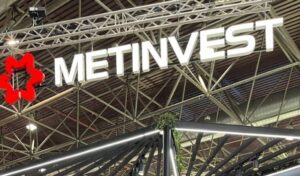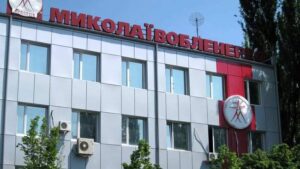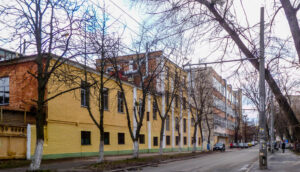
The aviation industry enterprise FED (Kharkiv) ended January-September 2025 with a net profit of UAH 176 million, which is 25.4% more than in the same period of 2024.
According to the company’s interim financial statements published in the NSSMC’s information disclosure system, its net income for this period increased by 32% to UAH 774.9 million.
FED received UAH 218.7 million in profit from operating activities, which is 17.3% more than last year, while gross profit increased by 30% to UAH 247.6 million.
As reported, in the first half of this year, FED JSC increased its net profit almost threefold compared to the same period in 2024, to UAH 158.2 million, with net income more than doubling to UAH 601.6 million.
Thus, in the third quarter of 2025, the company reduced its net profit by 4.8 times compared to July-September 2024, to UAH 17.8 million, while net income decreased by 42.3% to UAH 173.3 million.
FED JSC specializes in the development, production, maintenance, and repair of aviation, space, and general engineering equipment.
The average number of full-time employees as of October 1, 2025, was 953.
As reported, FED received UAH 181.4 million in net profit in 2024, which is 43% less than in 2023, of which 28% (UAH 40 million) was allocated to dividend payments. Net income decreased by 26% to UAH 831.7 million.

The mining and metallurgical group Metinvest intends to acquire a pipe plant in Romania (Tubular Products Iasi S.A., AMTP Iasi) from ArcelorMittal, which is controlled by ArcelorMittal S.A. (Luxembourg). According to a preliminary notification from the European Commission on the concentration, on October 21 of this year, the EC’s Directorate-General for Competition received a notification of the proposed concentration in accordance with the Council Regulation (EU).
It is specified that the concentration will be carried out through Metinvest’s acquisition of shares in AMTP Iasi.
After preliminary consideration, the Commission considers that the transaction may fall within the scope of the Merger Regulation. However, the final decision on this matter remains with the Commission.
The Commission invites interested third parties to submit their possible observations on the proposed concentration to the Commission.
AMTP Iasi, registered in Romania, is active in the production and supply of small welded carbon steel pipes.
Metinvest is a vertically integrated group of mining and metallurgical companies. Its enterprises are located in Ukraine, in the Donetsk, Luhansk, Zaporizhia, and Dnipropetrovsk regions, as well as in the European Union, the United Kingdom, and the United States. The main shareholders of the holding company are SCM Group (71.24%) and Smart Holding (23.76%). Metinvest Holding LLC is the management company of the Metinvest Group.

JSC “Mykolaivoblenergo” on October 30 announced a tender for compulsory insurance of motor civil liability (MTPL). As reported in the system of electronic procurement Prozorro, the expected purchase price of services – 2.317 million UAH.
Tender security is not required.
The last day to apply for participation is November 7.

As of October 31, farmers harvested 40.2 million tons of grain and legumes from 8.77 million hectares, which is 76% of the area sown with these crops, according to the Ministry of Economy, Environment, and Agriculture on its website.
Last year, on the same date, 47.2 million tons of grain were harvested from 11.106 million hectares, meaning that this year’s figures are 14.8% and 21.1% lower, respectively, mainly due to the later start of the corn harvest.
As noted by the Ministry of Economy, 10.36 million tons of corn have been harvested from 1.31 million hectares, while last year at around this date, 18.3 million tons were harvested from 3.07 million hectares.
As for wheat, its harvest is slightly higher than last year’s – 22.78 million tons from 5.05 million hectares compared to 22.30 million tons from 4.9 million hectares, while barley is slightly lower – 5.37 million tons from 1.35 million hectares compared to 5.50 million tons from 1.41 million hectares.
This year’s pea harvest is significantly higher – 660,700 tons from 271,300 hectares compared to 465,300 tons from 212,200 hectares last year, while buckwheat and millet are still significantly lower – 82,500 tons versus 126,900 tons and 61,500 tons versus 159,500 tons, respectively.
The harvest of other cereals and legumes this year reached 881.6 thousand tons from 317.6 thousand hectares as of October 24.
It is noted that among the leaders are, in particular, the Odesa region with 3.80 million tons, the Poltava region with 3.119 million tons, the Chernihiv region with 3.04 million tons, and the Vinnytsia region with 2.99 million tons.
The harvest of wheat, barley, and peas has been completed, the Ministry of Economy noted.
As for oilseeds, the rapeseed harvest has already been completed, and it turned out to be only slightly less than last year’s – 3.32 million tons against 3.5 million tons on almost equal areas of about 1.3 million hectares.
However, there is a significant lag in the harvesting of soybeans and sunflowers, which is still ongoing: 3.94 million tons of soybeans have been harvested from 1.52 million hectares, compared to 5.73 million tons from 2.52 million hectares on the same date last year, while sunflower seeds – 8.37 million tons from 4.24 million hectares compared to 9.599 million tons from 4.67 million hectares.
In addition, sugar beet harvesting is also lagging behind: 6.79 million tons have been harvested from an area of 130,100 hectares, compared to 9.5 million tons on the same date last year.
According to the Ministry of Economy, sunflowers have been harvested from 86% of the sown area, soybeans – 78%, and sugar beets – 66%.
In its Inflation Report published at the end of July, the National Bank of Ukraine lowered its forecast for this year’s grain harvest from 61.7 million tons to 57.9 million tons, and for oilseeds from 22 million tons to 21 million tons.
The NBU recalled that last year, the grain harvest in Ukraine fell to 56.2 million tons from 59.8 million tons in 2023, while oilseeds fell from 21.7 million tons to 20 million tons.
According to forecasts by Deputy Minister of Economy Taras Vysotsky, this year’s grain harvest will be around 56 million tons, the same as last year.

PrJSC Pokrovsky Mining and Processing Plant (PGZK, formerly Ordzhonikidze Mining and Processing Plant, Dnipropetrovsk region) reduced its net loss by 60% in January-September of this year compared to the same period last year — to UAH 218.489 million from UAH 545.746 million.
According to PGZK’s interim report for the first nine months of 2025, net income for this period increased by 6.1% to UAH 629.485 million. The uncovered loss at the end of September 2025 amounted to UAH 203.480 million.
As reported, in January-June of this year, PGZK reduced its net loss by 65.2% compared to the same period last year, to UAH 149.069 million from UAH 428.350 million, while net income for this period increased by 41.3% to UAH 479.767 million from UAH 339.617 million.
Based on its performance in 2023, PGZK increased its net loss 13 times compared to 2022, to UAH 624 million 48,108 thousand from UAH 47 million 932,515 thousand.
PGZK and Marganetsky GZK (MGZK, both in Dnipropetrovsk region), which are part of the Privat group, stopped mining and processing raw manganese ore in late October – early November 2023. In 2024, the plant was unable to resume operations due to a decline in demand for ferroalloys and a shortage of electricity.
In the first half of 2025, PGZK mined and enriched 22.87 thousand tons of manganese ore.
Four Cypriot companies — Profetis Enterprises Limited, Exseed Investmens Limited, Clemente Enterprises Limited, and Alexton Holdings Limited (all based in Cyprus) — each own 24.3024% of the private joint-stock company’s shares.
The authorized capital of the private joint-stock company is UAH 736.134 million, and the nominal value of a share is UAH 0.25.

The pharmaceutical company PJSC Kyiv Vitamin Plant (KVP) increased its net profit by 2.2 times in the first nine months of 2025 compared to the same period in 2024, to UAH 235.185 million.
According to the company’s disclosure to the National Securities and Stock Market Commission, net sales revenue for January-September 2025 increased by 2.5% to UAH 3.529 billion.
In January-September 2025, the company produced 35.770 million packages of medicines, for a total of UAH 4.268 576 billion at list prices.
The average selling price of one package of medicines produced by KVZ was UAH 133, the average cost of a package of KVZ dietary supplements was UAH 125, and medical products were UAH 263 per package.
In addition, the company reported that in the first nine months of 2025, KVZ exported products worth UAH 123.391 million, which is 3.5% of total sales. KVZ’s main export markets are Kazakhstan, Moldova, Latvia, Uzbekistan, and Israel.
The company plans to increase sales by 17.5% in 2025.
In addition, the company reported that total research and development expenses for the third quarter of 2025 amounted to UAH 5.246 million, which is almost twice as much as in the previous quarter.
The main distributors of KVZ products are BaDM LLC, Optima-Pharm, LTD, and VENTA. LTD.
The company reports that, based on the results of the first nine months of 2025, KVZ ranked fourth in the pharmaceutical market in terms of retail sales in monetary terms, with a market share of 3.29%.
As reported, KVZ increased its net profit by 8.74% compared to 2023, to UAH 156.84 million, and its revenue from sales of goods increased by 14.71% to UAH 4.944 billion in 2024.
KVZ is one of the ten largest pharmaceutical companies in Ukraine. The company’s product portfolio includes more than 100 medicines and 20 dietary supplements.
According to the Opendatabot system, the ultimate beneficiary of KVZ is Canadian citizen Maxim Martin.